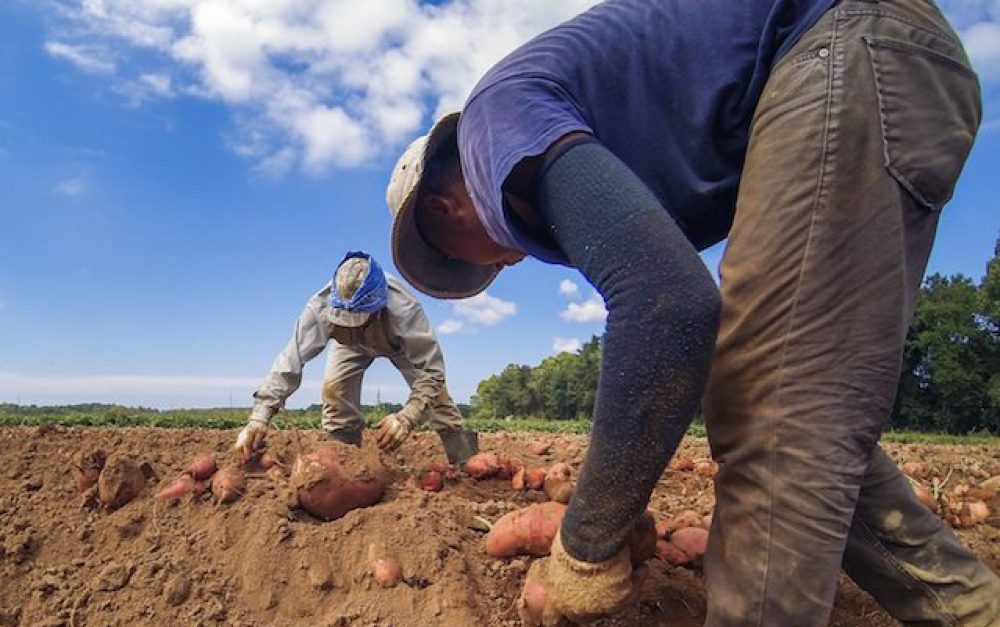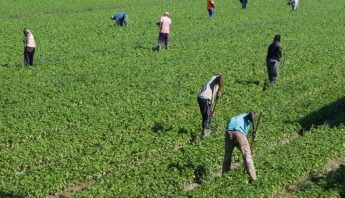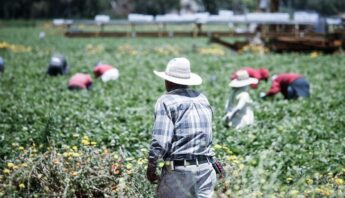The vast majority of farmworkers in the U.S. are immigrants, and at least half of them are undocumented. We depend on these many immigrants, who have come in search of a better life, for our nation’s abundant and safe food supply.
To commemorate National Farmworker Awareness Week, our partners at Farmworker Justice have written blogs that touch on different aspects of farmworkers’ living and working conditions. This blog was written by Farmworker Justice Staff Attorney Iris Figueroa, and was originally posted on Farmworker Justice in 2018. You can catch up with the current state of affairs by reading the March 2022 update from Farmworker Justice.
I’m one more person who comes to this country looking for a better life for myself and my family. During the months I’ve been with this company I’ve worked with different plants and vegetables… I miss Oaxaca [Mexico], my wife and my son. But what makes me happy is that they are doing better.” – Jose Silva, farmworker
The vast majority of farmworkers in the U.S. are immigrants, and at least half of them are undocumented. We depend on these many immigrants, who have come in search of a better life, for our nation’s abundant and safe food supply. Yet, the U.S.’ broken immigration system has created an untenable situation for farmworkers. Immigration policy and status impact every facet of farmworkers’ lives — from a worker’s ability to speak up about other challenges they may be facing, including labor rights violations, unsafe working conditions or a need for healthcare services, to farmworker parents’ fears of being separated from their children.
Under the Trump administration we experienced an increase in widespread and indiscriminate immigration enforcement. Even though many farmworkers have been in the country for years and even decades, immigration enforcement policies resulted in undocumented farmworkers being subject to immigration arrest, detention, and removal — regardless of how long they have been in the country, whether or not they have committed any crimes, and whether they have children, spouses or other family members who are U.S. citizens. One of the greatest fears among many immigrant farmworkers and other immigrant community members is the threat of family separation. The tragic deaths of a farmworker couple in California while being chased by immigration authorities highlights the depth of this fear.
With the recent escalations in immigration enforcement, an additional consequence is that agricultural employers are increasingly turning to the H-2A guestworker program. As they depend more on H-2A workers, agribusiness is unfortunately increasing their lobbying efforts to weaken the H-2A program’s already inadequate labor protections and oversight in the program. One such piece of legislation, Rep. Goodlatte’s Agricultural Guestworker Act, would create a new, highly exploitative guestworker program — the H-2C program — which would eliminate almost all protections found in the H-2A program, restrict worker access to justice, and seek to convert our entire system of food workers into a system of captive workers.
The H-2A program is already a highly exploitative program, where employers exert a great deal of control over workers due to the fact that workers are tied by their visa status to the employers that brought them to the U.S. Moreover, many H-2A workers come from impoverished communities and may arrive in debt, having borrowed money to pay illegal but all too common recruitment fees and other costs. In addition to the challenges workers face attached to their dependent non-immigrant status, debt and related issues, the problem of family separation is a painful reality H-2A guestworkers also face. Some guestworkers brought into the U.S. on H-2A temporary agricultural visas are separated from their families for months on end, year after year.
Our immigration system should not depend on migration models that force people to choose between financial support for their families and family separation. We should respect the valuable role of farmworkers in our agriculture and food system and reform our broken immigration system to ensure that they enjoy the democratic and economic freedoms of this nation. The first step toward a modern agricultural labor system must be to stabilize our current farm labor force through sensible immigration reform that includes a path to citizenship for farmworkers and their families. The Agricultural Worker Program Act (H.R. 2690/S.1034) does just that.
More information about farmworkers and immigration is available at: www.farmworkerjustice.org.







